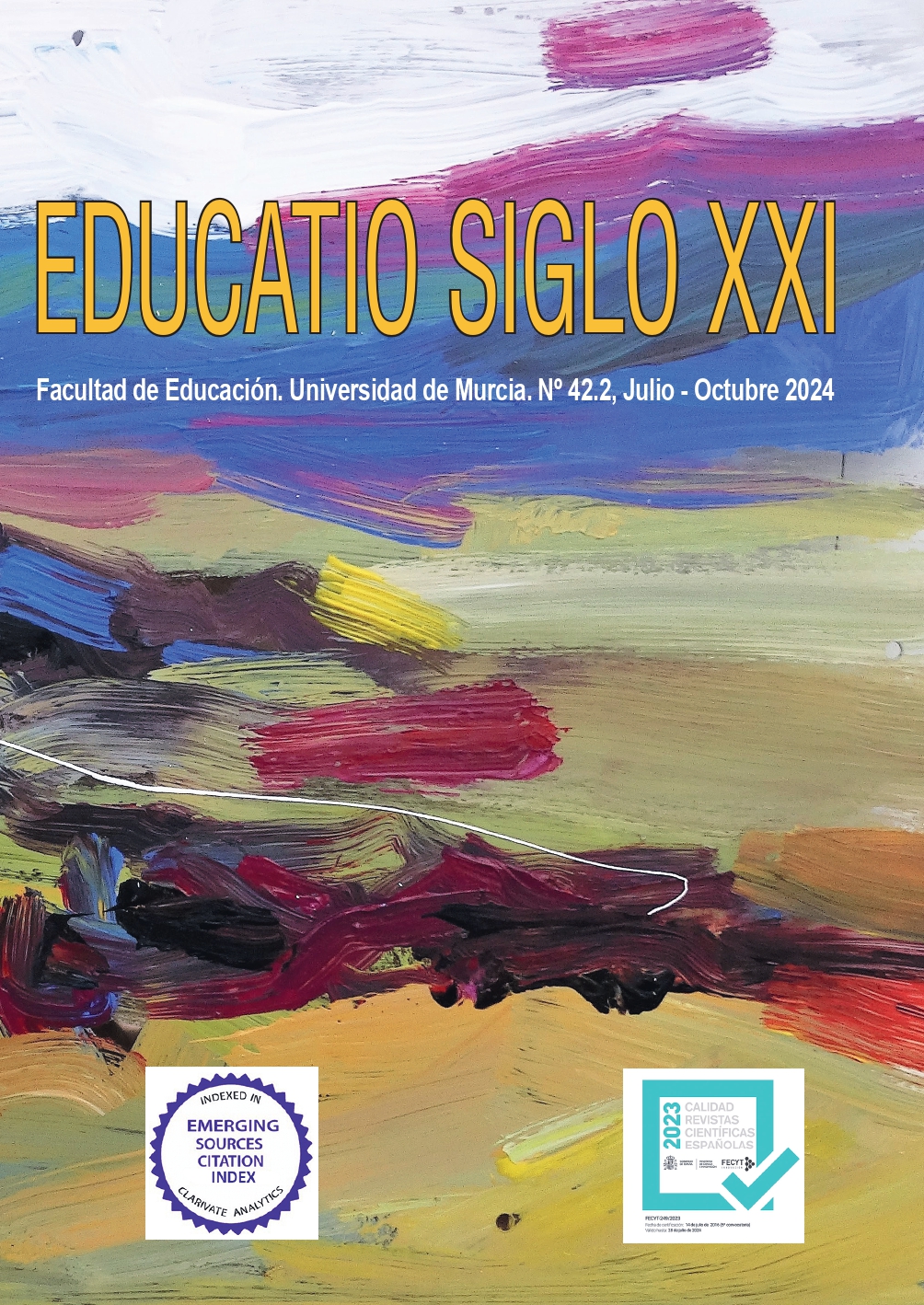Tutor competencies in the virtual teaching of differential equations for trainee engineers
Abstract
The growth of virtual and distance education, driven by Information and Communication Technologies, has highlighted the significance of tutor competencies in this context. This study focuses on the competencies required to facilitate the learning of differential equations in synchronous sessions, as conducted by the National Open and Distance University. A questionnaire was administered to students who rated web conferences on a scale of 1 to 5, accompanied by an openended question justifying their rating. Using a qualitative approach, grounded theory was employed for data analysis, identifying two axial codes grouped under the nuclear category: “Technological and Human Resources for Facilitating the Learning of Differential Equations in Web Conferences.” The results emphasize the fact that tutors should have indepth knowledge of the subject, course experience, technological skills, and adequate prior preparation. This study highlights the relevance of tutor competencies in the virtual teaching of differential equations for engineering students, providing insights to enhance the quality of distance education.
Downloads
-
Abstract599
-
PDF (Español (España))418
References
Allen, I. E., y Seaman, J. (2017). Distance education enrollment report 2017. Babson Survey Research Group. https://files.eric.ed.gov/fulltext/ED580868.pdf
Apaza Aquise, W. G. (2022). Beneficios del aula virtual percibidos por los estudiantes del primer año en la mejora de la enseñanza-aprendizaje de la asignatura de Filosofía y Lógica de la Facultad de Economía de la Universidad Nacional de San Agustín de Arequipa, 2020. http://hdl.handle.net/20.500.12773/14360
Ayala, R. A. (2020). Synchronous and Asynchronous Online Learning: A Guide for Academic Leaders. EDUCAUSE Review.
Basantes-Andrade, Andrea V., Cabezas-González, Marcos, y Casillas-Martín, Sonia. (2020). Competencias digitales en la formación de tutores virtuales en la Universidad Técnica del Norte, Ibarra-Ecuador. Formación universitaria, 13(5), 269-282. https://dx.doi.org/10.4067/S0718-50062020000500269
Carrasco, S. A. N., Castellanos-Ramírez, J. C., y Espinosa, F. P. (2021). Contraste de experiencias de estudiantes universitarios en dos escenarios educativos: enseñanza en línea vs. enseñanza remota de emergencia. Revista de Educación a Distancia (RED), 21(65). https://doi.org/10.6018/red.440731
Guerrero, S. C., Rojas-García, B., y Cuño-Bonito, J. (2021). Enseñanza-Aprendizaje en matemáticas y estadística durante la COVID-19. Universidad de los Llanos, Colombia. Revista Historia de la Educación Latinoamericana, 23(37), 41-67. http://www.scielo.org.co/scielo.php?script=sci_arttext&pid=S0122-72382021000200041
Grammens, M., Voet, M., Vanderlinde, R., Declercq, L., y De Wever, B. (2022). A systematic review of teacher roles and competences for teaching synchronously online through videoconferencing technology. Educational Research Review, 37, 100461. https://doi.org/10.1016/j.edurev.2022.100461
Hernández, V. D. C. F., Puello, N. P., y Rodríguez, M. A. Y. (2021). Usos y Alcance de la Videoconferencia por la plataforma zoom con fines educativos. Ciencias Sociales, 10(8), 159-175. https://www.eumed.net/uploads/articulos/9a3978712e59f6373a593b18842f918c.pdf
Jaar, J. C. (2021). Revisión actualizada: enseñanza de las matemáticas desde los entornos virtuales de aprendizaje. Ciencia y Educación, 5(2), 25-40. https://doi.org/10.22206/cyed.2021.v5i2.pp25-40
Juárez-Ramírez, J. A., Chamoso-Sánchez, J. M., y González Astudillo, M. T. (2020). Interacción en foros virtuales al integrar modelización matemática para formar ingenieros. Enseñanza de las ciencias: revista de investigación y experiencias didácticas,38(3), 161-178. https://doi.org/10.5565/rev/ensciencias.3041
Llano, J., Ainciburu, M. C., y Lázaro, O. J. (2011). La enseñanza de español a través de videoconferencias de escritorio, Integración en las diferentes modalidades de aprendizaje y desarrollo de competencias. Cuadernos Comillas, 2(18).
Mendoza, H. H., Burbano, V. M., y Valdivieso, M. A. (2019). El rol del docente de matemáticas en educación virtual universitaria. Un estudio en la Universidad Pedagógica y Tecnológica de Colombia. Formación universitaria, 12(5), 51-60. http://dx.doi.org/10.4067/S0718-50062019000500051
Moreno-Correa, S. M. (2020). La innovación educativa en los tiempos del Coronavirus. Salutem Scientia Spiritus, 6(1), 14-26.
Murillo-Díaz, A., Armendáriz-Núñez, E., y Ascencio-Baca, G. (2023). La transición de la modalidad presencial a la enseñanza remota de emergencia. Caso de estudio: Docentes de la Universidad Autónoma de Chihuahua. Revista de Investigación y Evaluación Educativa, 10(1), 6-27. https://doi.org/10.47554/revie.vol10.num1.2023.pp6-27
O'Brien, R. (2021). Synchronous and Asynchronous Teaching in a Hybrid Course. Mathematics Teacher: Learning and Teaching PK-12, 114(1), 47-53.
Olabe, X. B., y Parco, M. E. O. (2020). Integración de pensamiento computacional en educación básica. Dos experiencias pedagógicas de aprendizaje colaborativo online. Revista de Educación a Distancia (RED), 20(63), 1-21. https://doi.org/10.6018/red.409481
Olivo-Franco, J. L., y Corrales, J. (2019). De los entornos virtuales de aprendizaje: hacia una nueva praxis en la enseñanza de la matemática. Revista Andina de Educación, 3(1), 8-19. https://doi.org/10.32719/26312816.2020.3.1.2
Palop, Vicente. (2015). Aportes del software NVIVO para el trabajo con la Teoría Fundamentada o Grounded Theory. Revista Andina de Estudios Políticos, 5(2), 31–46. https://doi.org/10.35004/raep.v5i2.80
Sadiku, M. N. O. ., Shadare, A. E. ., Musa, S. M. ., y Akujuobi, C. M. . (2016). Data Visualization. International Journal of Engineering Research and Advanced Technology, 2(12), 11–16. https://ijerat.com/index.php/ijerat/article/view/191
Sgreccia, N. , Cirelli, M., y Vital, M. (2019). Cualidades de profesores en matemática recordados como buenos por futuros profesores en matemática. Revista iberoamericana de educación superior, 10(27), 172-193. https://doi.org/10.22201/iisue.20072872e.2019.27.346
Zhang, D., Zhao, J., Zhou, L., y Nunamaker Jr, J. F. (2004). Can e-learning replace classroom learning?. Communications of the ACM, 47(5), 75-79. https://doi.org/10.1145/986213.986216
Copyright (c) 2024 Servicio de Publicaciones de la Universidad de Murcia

This work is licensed under a Creative Commons Attribution-NonCommercial-NoDerivatives 4.0 International License.
Original work publishes in this journal is subject to the following terms:
1. Murcia University Press (the publishing house) holds the copyright of the publishes work, and favours and allows their reutilization under the use license stated in point 2.
© Servicio de Publicaciones, Universidad de Murcia, 2015
2. Work is published in the electronic edition under a license (Creative Commons Reconocimiento-NoComercial-SinObraDerivada 4.0 España (legal text). They can be copied, used, disseminated, transmitted and publicly presented, as long as: i) authorship and original publication source is acknowledged (journal, publishing house and URL of the work); ii) are not used for commercial purposes; iii) the existence and specifications of this use license is stated.
3. Conditions for self-archive. Authors are allowed and encouraged to disseminate electronically the pre-pint (before review) and/or post-print (accepted for publication) versions of their work before their publication since that favours earlier circulation and dissemination resulting in an increased chance for the authors to be cited and for the work to reach a bigger share of the academic community. Colour: RoMEO: green.








